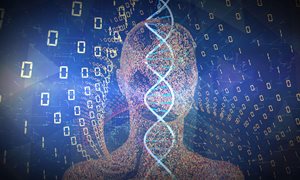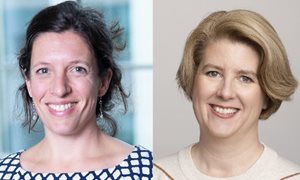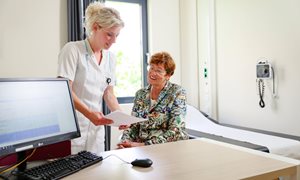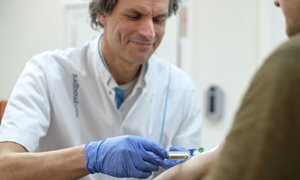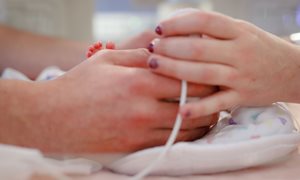News items
Thomas Maal appointed full professor
7 January 2019
“When imagining the 3D Lab, many people think of a room full of 3D printers, but we do a lot more than that”, says Maal, coordinator of the 3D Lab since 2012. “In addition to 3D printing, we are involved in robotics and augmented reality. These technologies play an increasingly more important role in healthcare. For example, 3D imaging and 3D printing are valuable techniques for identifying disorders: we can obtain a better, three-dimensional image of the situation and can therefore make a better diagnosis. We can also prepare operations in 3D and evaluate results accurately. In this way an optimal patient-specific solution is created.”
Fewer additional operations
Surgeons can work much more accurately with operations that are planned in 3D. Maal: “The surgical error rates have decreased substantially. This means that fewer additional operations are needed. With 3D support you can place implants with high precision, for example after a leg amputation. As a result, patients can regain their ability to walk more quickly and effectively.” According to Maal, the 3D technique is also more patient-friendly, for example for people who switch from a denture to a dental implant. In the past, after the operation, patients remained toothless for three to six months. Now they receive a 3D-printed implant immediately after the procedure.
As a professor, Maal is committed to the further implementation of 3D technology in healthcare. He will continue his line of research and look for innovative 3D technologies to change and improve patient care. In addition, he will expand the existing national network. As a result, more patients in the Netherlands and beyond will be able to benefit from the great possibilities offered by 3D technology.
In 2006, Thomas Maal started using 3D photography at the Department of Oral and Maxillofacial Surgery at Radboud university medical center; since 2012 he has been a staff member and coordinator of the 3D Lab. In 2013 he also became coordinator of the 3D lab at AMC Amsterdam. The 3D Lab now employs 15 engineers from various backgrounds, from technical physicians to game specialists. Besides the Department of OMS, 15 other departments at Radboud university medical center are now benefitting from these new technologies. The 3D Lab also cooperates nationally with some 15 general hospitals and four UMCs.
Thomas Maal is member within the theme of Reconstructive and regenerative medicine.
 Thomas Maal is the first professor of 3D Technology in Healthcare. In 2006, together with Professor S.J. Bergé, he founded the 3D Lab in Nijmegen. The 3D Lab aims for the continuous improvement of 3D technology in healthcare.
Thomas Maal is the first professor of 3D Technology in Healthcare. In 2006, together with Professor S.J. Bergé, he founded the 3D Lab in Nijmegen. The 3D Lab aims for the continuous improvement of 3D technology in healthcare.
“When imagining the 3D Lab, many people think of a room full of 3D printers, but we do a lot more than that”, says Maal, coordinator of the 3D Lab since 2012. “In addition to 3D printing, we are involved in robotics and augmented reality. These technologies play an increasingly more important role in healthcare. For example, 3D imaging and 3D printing are valuable techniques for identifying disorders: we can obtain a better, three-dimensional image of the situation and can therefore make a better diagnosis. We can also prepare operations in 3D and evaluate results accurately. In this way an optimal patient-specific solution is created.”
Fewer additional operations
Surgeons can work much more accurately with operations that are planned in 3D. Maal: “The surgical error rates have decreased substantially. This means that fewer additional operations are needed. With 3D support you can place implants with high precision, for example after a leg amputation. As a result, patients can regain their ability to walk more quickly and effectively.” According to Maal, the 3D technique is also more patient-friendly, for example for people who switch from a denture to a dental implant. In the past, after the operation, patients remained toothless for three to six months. Now they receive a 3D-printed implant immediately after the procedure.
As a professor, Maal is committed to the further implementation of 3D technology in healthcare. He will continue his line of research and look for innovative 3D technologies to change and improve patient care. In addition, he will expand the existing national network. As a result, more patients in the Netherlands and beyond will be able to benefit from the great possibilities offered by 3D technology.
In 2006, Thomas Maal started using 3D photography at the Department of Oral and Maxillofacial Surgery at Radboud university medical center; since 2012 he has been a staff member and coordinator of the 3D Lab. In 2013 he also became coordinator of the 3D lab at AMC Amsterdam. The 3D Lab now employs 15 engineers from various backgrounds, from technical physicians to game specialists. Besides the Department of OMS, 15 other departments at Radboud university medical center are now benefitting from these new technologies. The 3D Lab also cooperates nationally with some 15 general hospitals and four UMCs.
Thomas Maal is member within the theme of Reconstructive and regenerative medicine.
-
Want to know more about these subjects? Click on the buttons below for more news.
Related news items
